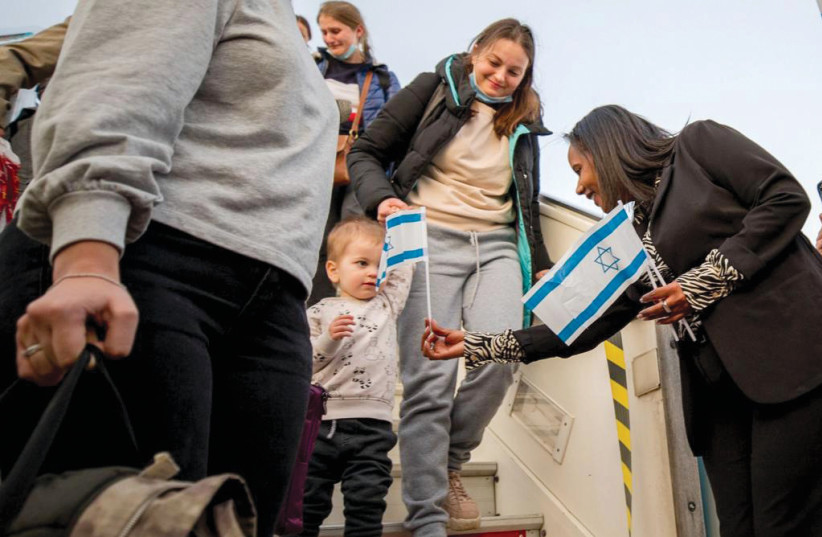In a world rife with geopolitical upheaval, global migration patterns shift and change, reflecting the ebb and flow of international events.
A recent report from The Jewish Agency for Israel, obtained exclusively by The Jerusalem Post, shows a dramatic illustration of this dynamic, revealing a significant drop in Jewish immigration, or aliyah from Western countries to Israel during the first half of 2023, even as numbers from Russia show a notable rise.
This trend aligns with the ongoing conflict in Ukraine, which appears to be a major contributing factor to the fluctuation in migration statistics.
The number of immigrants from Western European countries arriving in Israel during January-June 2023 was recorded at 889, marking a decrease of 44% compared to the same period in the previous year. Country-specific data portrays a sharper downturn. French Aliyah, for example, fell by 59% to 393 immigrants, and from Britain, the number dropped by 40% to 171 immigrants.
In contrast, the data shows a significant surge in aliyah from Russia. Amidst the escalating Russian-Ukrainian conflict, the number of immigrants from Russia rose sharply, marking a 32% increase with 22,851 immigrants compared to the same period in the previous year.

Refugee aliyah
This influx from Russia contrasts starkly with the immigration trend from Ukraine, which saw a steep decline. A mere 1,463 immigrants arrived from Ukraine in the first half of 2023, representing only a tenth of the number compared to the same period in 2022. This sharp decrease is most likely tied to the ongoing war, disrupting migration and further fueling the increase in immigration from Russia.
The overall global trend shows a 16% decrease in aliyah, with 30,774 immigrants arriving in Israel in the first half of 2023, compared to 36,630 during the same period in 2022.
Global events, such as the conflict between Russia and Ukraine, have a significant impact on migration patterns. As the unrest continues, its ripple effects are clearly seen in the changing demographic landscape of immigration to Israel.
Other events such as the current unstable Israeli political system, as well as the many demonstrations in Israel may also have had an effect on aliyah. Other factors may have to do with the extremely expensive cost of living in Israel. Many potential immigrants from France, for instance, have found it very difficult to find affordable housing in Israel after selling or planning to sell their homes in France.
This decrease is the opposite of what current Aliyah and Integration Minister Ofir Sofer has been working for. As published in the past few months by the Post, Sofer has pledged to invest NIS hundreds-of-millions per year that “will be allocated for the purpose of programs to encourage the aliyah of young Jews from the US and France.”
Sofer told the Post in an interview, that he definitely wants "to put all of my efforts into the absorption of more immigrants from the Western countries, mainly the US and France.”
The reasons for investing in aliyah from Western countries are varied; Firstly, North America and France consist of the world's largest Jewish communities outside of Israel. Secondly, the aliyah from these countries is mainly of Jews who are recognized as such by the Israeli Chief Rabbinate and therefore ideologically more fit for this current government's conservative ideology.
Yet as the situation in Russia becomes worse, Israel will need to invest more funds in the absorption and integration of new Israeli citizens from Russia and Ukraine. The fact that most of them are recognized as Jews according to the Jewish law, makes their arrival in Israel not very positive on behalf of the religious parties and many members of the Likud.
"Since assuming the position of Aliyah and Integration Minister six months ago, I have become aware of a concerning trend regarding the decline in the number of immigrants from Western countries and the challenges faced in opening immigration files from these regions in recent years," Aliyah and Integration Minister Ofir Sofer responded said in response to this report.
"In response, I have taken the initiative to develop a comprehensive strategic plan aimed at facilitating the immigration of Jews from France and the United States. The primary objective of this plan is to increase the number of immigrants from these countries by implementing targeted measures.
"Our current program focuses on encouraging young individuals to immigrate and integrate into academic institutions. Moreover, it addresses critical barriers to successful absorption in Israel, such as Hebrew language studies, streamlining bureaucratic processes, providing employment placement courses, and facilitating the recognition of degrees, licenses, and diplomas. We are also committed to supporting families and communities throughout their transition in Israel.
"Unfortunately, the infrastructure for Western Jewish immigration, including the specific immigration needs of French and American Jews, has been neglected for years. This has resulted in a steady decline in immigration figures, as evident from the data.
"However, I am confident that the determined efforts we are undertaking, in close collaboration with the Jewish Agency and other partners, will reverse this trend and generate renewed interest in immigration. We have already witnessed positive outcomes since the implementation of programs tailored to young individuals from France, specifically targeting fields such as engineering, pre-medical studies, and master's degrees," Sofer concluded.
